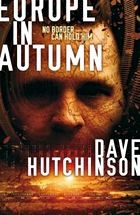The moon blew up with no warning and with no apparent reason.
That’s how Seveneves begins, and it pulled me right in. I stayed up until 3am last night to finish this 867-page hard science fiction novel, to the point that my eyes were watering and my cat was giving me the stinkeye for keeping her awake.
There doesn’t seem to be a good way to explain just how much this book encompasses and how well it does it. There’s lots and lots and lots of orbital space mechanics, which is a very tasty subject. There’s politics (of course), and efforts to save humanity by going to space, and heroics, and an Earth that is destroyed. There’s epigenetics, and new strains of mankind, and delving into what it all means, if anything. This is a hard science fiction apocalyptic scenario in which humankind survives, but survives by changing radically.
The first third of the book deals with the destruction of the moon itself, something that is never explained but simply is. A character that reflects Neal DeGrasse Tyson to an amusing degree figures out what is going to happen as chunks of broken Moon begin falling onto Earth, and works out a timeline in which humanity must find a way to save itself before the surface of the Earth consists solely of fire and molten rock. There is a mad rush to select the best of humanity as well as its most competent, to be sent into space in vehicles that can attach to the International Space Station. Out of 7 billion people, perhaps 20,000 are expected to survive, with any luck. Spoiler alert: they don’t have much luck.
The second third concerns after the Earth is destroyed. Along with humanity in space comes politics, with all the rancor and inability to cooperate that entails. There’s also a rift between the “regular people” who were chosen to learn space mechanics in order to join with the ISS (via a lottery that each country or major metropolitan area conducts), and those who are already there because they have extensively specialized skill sets – robotics, astrophysics, epigenetics, psychology, sociology, biology, etc. In the end only seven people survive it all – seven women. There isn’t a lot of amity among these seven remaining women, who break roughly into aligned groups of 4, 2 and 1, but they work out a deal for rebuilding the human race and then do it.
This is where I’ve seen reviews complain about the gap in the story. Neal doesn’t go step-by-step (as he is so often wont to do), about how the plan these women have made is implemented. Instead he jumps right into the third section, which sees us 5000 years into the future, with the Earth finally cooling down enough for terraforming to begin, and seven differing races of humans, based on the choices each of the Seven Eves made. I can agree that the jump from we’re-all-going-die-in-space to oh-wait-we-didn’t-and-look-at-all-these-cool-things-we-built-up-there-while-breeding isn’t the smoothest, but I disagree that the third section of the book is the weakest. It’s not weak, it’s just an unexpected pivot given the first two sections.
I happen to love Neal Stephenson since I first picked up a copy of Snow Crash and was pulled willy-nilly into the world of Hiro Protagonist. His books have gotten more serious, more thorough, and more hard core since then, but I don’t mind. He writes a damned good story and makes you think while he does it. There’s plenty of good characterization and sub-plots to keep people entertained while he goes into multiple pages of technical explanations, and if you’re like me, you love the technical bits, too. It is hard science fiction, after all.
If this site gave stars, this book would have 5 of them from me. It was right up my alley in nearly all respects, and will come highly recommended by me to anyone who asks.

